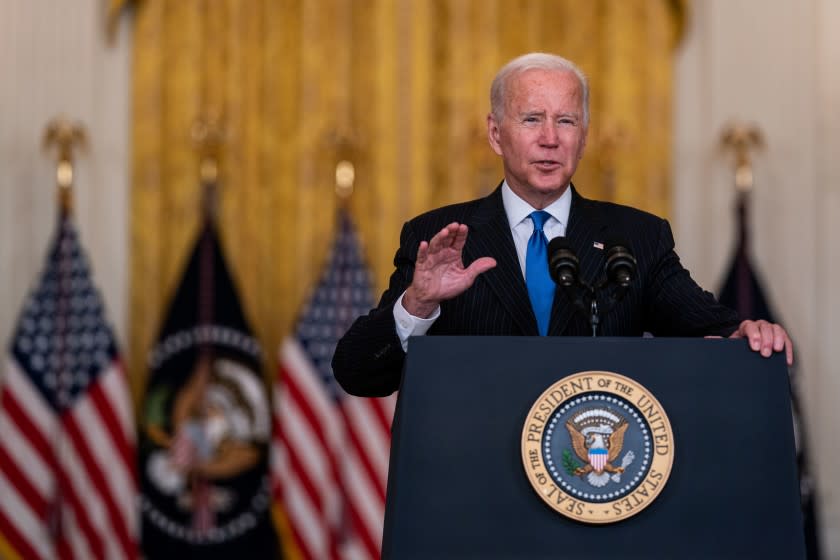Five things to know about the Biden administration's vaccine mandates

- Oops!Something went wrong.Please try again later.
The Biden administration believes mandating COVID-19 vaccines is the best way to reduce unnecessary hospitalizations and deaths and get the U.S. economy on more solid footing.
President Biden has announced a wave of vaccine requirements, the most sweeping of which will affect businesses with more than 100 employees. That regulation, which is expected to soon be issued by the Labor Department, and other Biden rules could end up affecting two-thirds of the U.S. workforce. Biden said on Thursday that getting vaccinated will help "put this pandemic behind us and accelerate our economic recovery."
What sorts of mandates are the Biden administration issuing?
The broadest mandate will affect businesses with more than 100 employees. Under a rule proposed by the Department of Labor's Occupational Safety and Health Administration, such companies will be required to ensure their workers are fully vaccinated or undergo weekly testing for the coronavirus. The plan would also give workers access to paid time off to get their shots and recover from any side effects. OSHA could levy a $14,000 fine on businesses that don't comply.
OSHA on Tuesday submitted a proposed rule to the White House for approval, and that regulation is expected to soon be finalized, according to news reports.
Another mandate targets about 17 million healthcare workers: The Department of Health and Human Services is crafting a regulation that will affect workers at about 50,000 providers, including hospitals and dialysis centers, that receive Medicare and Medicaid reimbursement, according to the White House.
Biden has also enhanced vaccine requirements for the federal workforce. Federal employees must be fully vaccinated by Nov. 22 or face disciplinary action. Federal contractors have until Dec. 8 to be fully vaccinated.
Biden's requirements would affect around 25 million unvaccinated American workers and could result in 12 million people, or more than 3% of the total population, getting vaccinated by March, according to analysts at Goldman Sachs. The requirements could bring the rate of partial vaccination among the total American population up to 82% by mid-2022, the analysts found. About 90% of adults would have at least one dose of a vaccine, the analysts wrote.
Why is Biden seeking mandates?
The Biden administration was initially optimistic that vaccine rates would increase without mandates. But the more contagious Delta variant led to a spike in cases while vaccination rates have declined. Since spring 2020, the coronavirus has killed more than 716,000 Americans. The increase in cases and the massive death toll altered the White House's calculus on mandates.
The nation "is in a very critical period as we work to turn the corner on COVID-19," Biden said Thursday. So far, about 77% of eligible Americans have had at least one shot, according to federal statistics, and about 66% are considered fully vaccinated.
Why is Biden working so hard to sell mandates?
The president has met stiff resistance from Republicans in seeking to enact vaccine requirements, and his mandates are expected to face legal challenges.
Two dozen Republican state attorneys general last month called Biden's plan "counterproductive" and "illegal" and vowed to fight the requirement on businesses in court.
Republican-controlled states have also sought to derail that mandate. Texas Gov. Greg Abbott on Monday issued an executive order that bars all entities, including private businesses, from enforcing a vaccine mandate. In Arkansas earlier this month, lawmakers approved a measure that would create exemptions for workers facing mandates.
How does the public view the plan?
Half of Americans approve of the OSHA plan, according to a poll by the Associated Press-NORC Center for Public Affairs Research released last month. While 51% say they approve of the plan, 34% disapprove and 14% hold neither opinion.
Support for the plan tends to reflect party allegiances. While 77% of Democrats back the plan, 62% of Republicans disapprove of it, the poll found.
How do companies feel about the mandates?
Even before Biden announced the OSHA rule, large corporations were implementing mandates of their own. Many business leaders have said mandates will get employees back into offices and factories, and boost profits.
When Tyson Foods in August required workers to get vaccinated, less than half had gotten a shot, according to the White House. By late September, over 70% of its workforce had gotten at least one shot. The food giant gave workers until Nov. 1 to comply with the policy.
Other corporations like Cisco, Delta Air Lines, CVS Health, Google and Goldman Sachs have a variety of policies that either incentivize or require workers to get vaccinated. Some of the policies allow exemptions for workers for medical or religious reasons.
This story originally appeared in Los Angeles Times.

